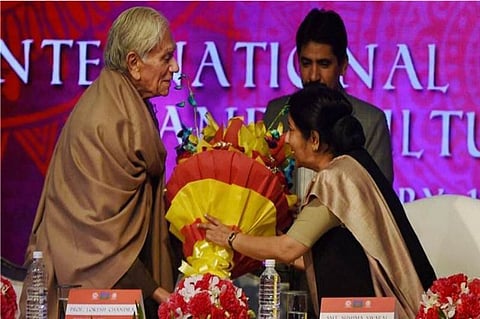
- Union Budget 2026
- Home
- NewsGram USA
- India
- न्यूजग्राम
- World
- Politics
- Entertainment
- Culture
- Lifestyle
- Economy
- Sports
- Sp. Coverage
- Misc.
- NewsGram Exclusive
- Jobs / Internships

New Delhi: An International Conference on Roma culture held in the city concluded on Sunday with a call to recognize them as India's diaspora. This appeal from the Roma community came after External Affairs Minister Sushma Swaraj described the Roma community spread across the world as 'children of India'
"Roma people are an Indian nation, the autochthonous territory of southeastern and western Europe, but also in other parts of the world, with all attributes that make them a special national entity," Jovan Damjanovic, president of the World Roma Organization, said at the three-day International Roma Conference and Cultural Festival 2016 here.
"We would like to be treated as the Indian diaspora and can make a contribution to our country of origin's growth," he said at the conference organized by the Indian Council for Cultural Relations (ICCR) and the Antar Rashtriya Sahayog Parishad (ARSP) – Bharat.
Inaugurating the conference on Friday, Sushma Swaraj said: "You are the children of India, who migrated and lived in challenging circumstances in foreign lands for centuries. Yet you maintained your Indian identity.
"A strong 20 million population of your community spread over 30 countries, encompassing West Asia, Europe, America, and Australia speaks of your unique ability of adapting to foreign cultures. We in India are proud of you… Welcome you with an open heart."
Said to be descendants of nomadic groups in northwest India like Dom, Banjara, Gujjar, Sansi, Sikligar, Dhangar and others, Romas are known as "Zigeuner" in Germany,"Tsyiganes/Manus" in France, "Tatara" in Sweden, "Gitano" in Spain, "Tshingan" in Turkey and Greece, "Tsigan" in Russia, Bulgaria and Romania and "Gypsies" in Britain.
A resolution adopted at the conclusion of the conference on Sunday called for people-to-people contacts between Indians and Romani people to be encouraged.
"The cultural recognition of Romani people is of utmost importance for strengthening bonds with Roma," it stated.
It also said that there was a need to set up a cell in the external affairs ministry to study and research the origin of Roma people and examine what status India can accord them.
It said that their language to be researched to find its roots and heritage in India and Indian students be taught the history of the Roma people and their migration.
The 11-point resolution also called for the Romani language to be taught in Indian schools and universities as a recognized foreign language and the preparation of a Romani-Hindi dictionary.
"An international cultural festival of Roma should be held in India every two years on the pattern of the Pravasi Bharatiya Divas," it said, and also sought a Roma research center be set up in India.
For economic uplift of the Roma people, it also called for provision of micro finance facility to young Roma entrepreneurs.
"Economic relations between India and Romani people should be encouraged. Romani people should be invited to contribute and be a part of India's development process in a mutually beneficial manner," it said.
The resolution also called on Indian human rights organizations to take up the issues of violation of human rights of Romani people with all national and international agencies.
Gina Rubik, niece of Enro Rubik, inventor of the Rubik's Cube, said: "We the Roma are of Hindustani origin."
Gina speaks fluent Hindi and sang two of the Hindi songs she has written – "Yadoon ki kahani" (Story of Memories) is written in memory of the bomb blast victims in India, and the second, "Dehshatgardi ka khaatma" (The end of terror), offers a solution against hate and anger which has hindered the peace process in the subcontinent. (IANS)
